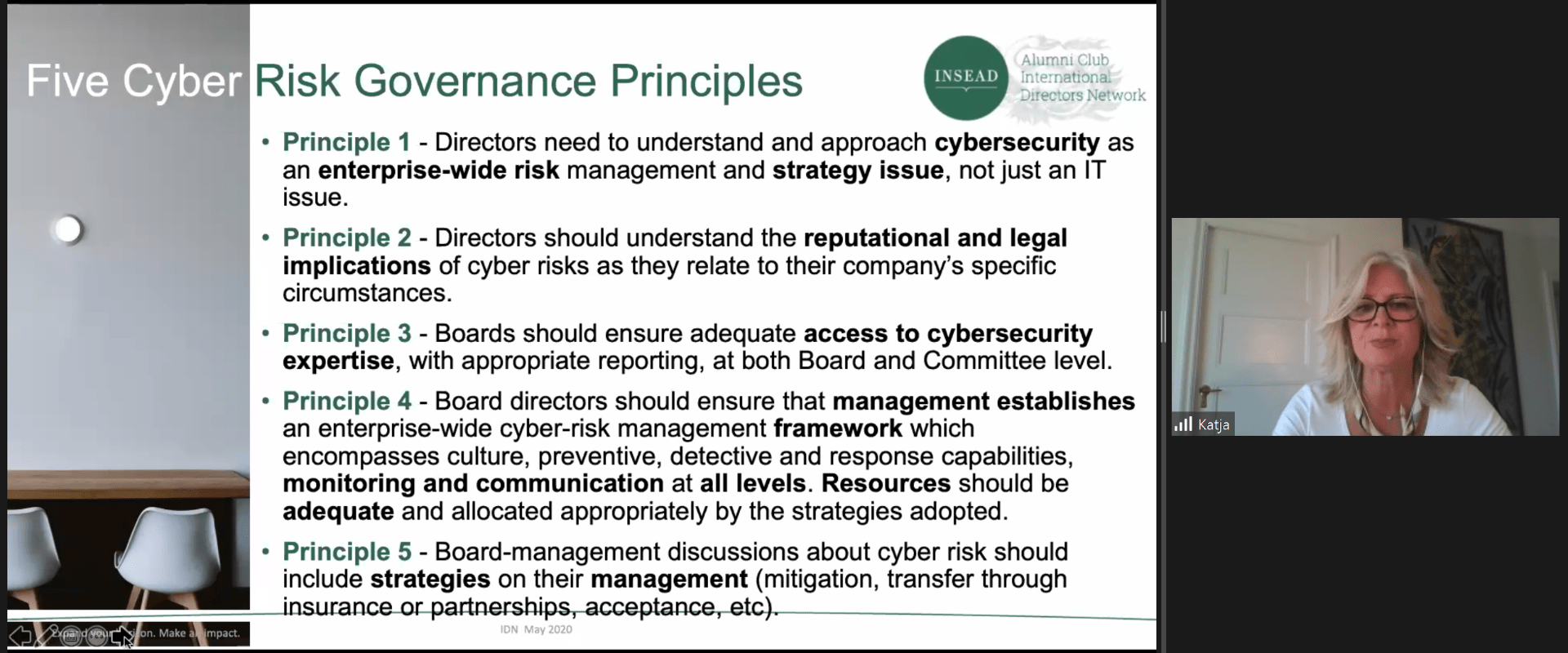OECD-CFA Institute Webinar in collaboration with INSEAD IWIB Club
By Marina Niforos, IDN Ambassador France and Non-Executive Director
On 29 June 2020, the CFA Institute and OECD co-organized a discussion on the challenges that boards are facing in the aftermath of this unprecedented crisis we are going through and on the lessons that can be learned for ‘building back better”. IDN Ambassador France, Marina Niforos participated in the discussion that aimed to address the role corporate governance can play in navigating the “new normal” and how board diversity can contribute to the reconstruction phase.
Josina Kamerling (Head of Regulatory Outreach, CFA Institute) opened the panel, stressing the following: Despite codes metrics and consistent efforts to increase gender diversity at Boards over many decades, change remains slow and does not always trickle down to action. Will this crisis present an opportunity for Women in Leadership? Uncertainty is the new normal: A Threat or an Opportunity?
While the participants came from different board backgrounds (regional, supervisory board, corporates, funds, insurance, infrastructure, sovereign funds) there seemed to be consensus on the nature of the crisis and the impact:
- The nature of the COVID19 crisis is unprecedented, of a much larger magnitude that the 2008 financial crisis. People are questioning the fundamentals on both a professional and personal basis, as they are confronted with a threat on their own wellbeing and of the things they value most. A ‘grey swan’ or a ‘black swan’, the recent crisis has ‘put in question many past orthodoxies and shown boards that we cannot solve unpredictable challenges without increased diversity of thinking at board level. As Georges Desvaux (Axa, Chief Strategy Officer) noted:
”Boards will require a new skillset, that goes beyond from the typical profile of a another CEO that was the preferred candidate of choice for board seats”.
- In practice, according to Marina Niforos (NED, HCAP), corporate governance is facing opposing forces: on the one side, boards are thrown by circumstance into a crisis management mode, firefighting role that pushes the perception that ESG and general sustainability considerations are a luxury for “when times get better”. On the other hand, there is increasing pressures from stakeholders (customers, employees, investors, regulators and citizens at larger) that are stressing the need to address these issues as strategic in establishing trust and ensuring that economic recovery is perceived as possible and equitable by all. Boards and companies who are unprepared to provide credible answers and scenarios will be subjected to public scrutiny and reputational risk. McKinsey’s report Diversity Still Matters makes the compelling business case that companies with more gender diversity and ethnic diversity outperform their peers, contributing to the resilience and long-term performance of the organization.
- Franca Ruhwedel (Professor and NED) stressed that, despite the focus on short-term risks, a positive development has been the change of tone and new culture of ‘discussion’ in Supervisory Boards in two tier systems, allowing SBs to move beyond a compliance, tick the box modus operandi to a more hands on, strategic approach and has fostered stronger ties between supervisory and management boards.
- This crisis can be an opportunity to advance in the diversity and sustainability of boards and the companies they serve. Whether NEDs or executives, Boards need to seize the opportunity as to address these issues as a strategic medium-and long-term objective that will define their competitive advantage. The complexity of the new challenges, ESR ones at the front, and the agility required to adapt now call for new profiles, more connected to the market reality, the ones that will be able to figure out resilient scenarios and better solutions for long term sustainability.
- This need for a diverse skills set on the Board, a greater stakeholder management experience and empathetic leadership presents an opportunity to go beyond the traditional profiles and closed network where board members were co-opted and allow more professional women to enter the pipeline. According to Marina Niforos, this will require professionalization of board searches and a move from credentials of that “make the board look good to criteria that make the board do good”. “Strategical broader vision expected from board members requires not only technical or industry specifics competencies but also a more global mindset and open-minded collaborative attitude that let opportunities for more diverse talents” said Nicole Gesret (CEO, SITG).
The Link between Diversity and Sustainability: How to measure Impact?
“Boards are accountable to contribute to truly to their shareholders but also to the overall ecosystem of stakeholders and to the next generation: how can we use experience to measure board diversity on corporate sustainability?” (Josina Kamerling)
There is a lot of discussion since the COVID19 breakout on the need to put sustainability squarely on the agenda of companies. In the past, many companies made bold statements about the importance of sustainability but few addressed it as part of business strategy, relegating it to the realm of CSR policy. The crisis has made people realize the fragility of our ecosystems and the vulnerability this implies for us and our societies. There is increasing grass roots momentum as citizens are very concerned about the future and potential threats and are pressuring their own political representatives to take sustainability considerations and climate more seriously and customers are challenging companies on the origin and quality of the products they buy. In turn, governments are mobilizing to ensure that climate becomes a policy priority with specific conditionality for companies, as for example in the case of granting EU state aid for the post-COVID recovery, eg. Air France.
Additionally, mainstream investment funds and asset managers are clamoring to claim the space of ‘green investments’, to discredit perceptions of ‘green washing’, creating new funds and making capital commitments for green investments (Goldman Sachs, JPMorgan) Yet, in order to take advantage of this wave of good will and translate pressure from stakeholders into lasting results, certain critical success factors need to be at play:
- Metrics are key: “what get’s measured, get’s done”.
- Convergence around a common methodology that allows for progress checking and benchmarking is important to provide transparency across industries and sectors. Initiatives such as the Taxonomy for Sustainable Finance at EU level is intended as an effort to provide a market standard. However, if tools are too complex to apply, SMEs who do not have same resources as large companies may find themselves at a competitive disadvantage.
- At the same time, pressure for compliance to these demanding standards will push boards to search for the requisite skillset, opening up more board seats for women and men.
- Training and corporate culture change is a continuous process and needs to have investment by the board: The skillset regarding Diversity and inclusion culture, same as ethics, is something that should form part of the continuing education of Directors, so that their more openness of spirit at board discussions, tolerance for dissension and move beyond just the simple ticking the box.
- Accountability for results: Boards need to hold management accountable for diversity and ESG objectives. In an environment of post crisis pressure management will be risk averse and unwilling to take on less conventional profiles on their boards. The board a s collective should ensure that management stays on track and does not lose its focus. The example of a ‘living cv’ that is a public registry tracing the past performance of Board Directors was held as a practical example of an accountability mechanism accessible to all.
- Board self-assessments: Beyond management, boards should exercise their own self evaluation at board and/or committee levels, with external evaluators when possible, to encourage introspection and have specific action plans when weaknesses are identified. Those can be publicly disclosed on company websites for full transparency.
- Diversity is not just a Board issue: diversity is not just a question of board composition but of the company talent management strategy as a whole, a strategic objective squarely under the Board’s oversight. It is important to ensure that a culture of inclusion is reflected is senior management and the different management levels of the company to ensure a robust pipeline.
Key Recommendations for policymakers and companies
- Boards “Need to walk the talk”, to show demonstrable and measurable results not just paper. Demonstrate by example, as we have seen Danone in changing their legal status to a ‘purpose-driven company’. This type of public commitment then becomes a process for delivering results.
- Policymakers should actively engage with private companies to encourage positive outcomes through the right incentives. This exercise should not be about format, but about a continuous dialogue and will require flexibility and persistence
- Companies should not wait for the regulator to impose quotas or similar measures but should actively have develop their own self-governance initiatives to encourage diversity. • Setting quotas might work for some countries and cultures while others will be more resistant to top down approach.
- Go beyond the compliance approach. You can comply with the law and still not do a good job. The important thing is to ensure transparency, report on what you are doing on diversity, have it on the board agenda, report on how do you do the selection and then let the market do its work.
- Regulators should ensure, where they can, that boards have sufficiently trained and certified board directors and ask that it becomes the standard, thereby creating a market for these skills.
OECD Representative, Mathilde Mesnard (Deputy Director, Financial and Enterprise Affairs) closed the conference stressing that the crisis is perhaps creating a paradox. Women at the bottom of the pyramid are disproportionately impacted and data indicates that violence against women is on the rise since the outbreak, but on the other hand, we might have an opportunity to make a a difference for women in leadership and women on boards, if we manage to maintain momentum and put in practice some of the lessons learned.














